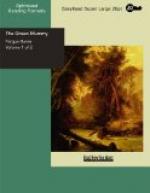“Well?” demanded Lucy impatiently.
Mrs. Jasher shrugged her plump shoulders.
“Well, my dear, can’t you put two and two together. Of course Sir Frank fell in love with this dark-hued angel.”
“Dark-hued! and I am light-haired. What a compliment!”
“Perhaps Sir Frank wanted a change. He played on white and lost, and therefore stakes his money on black to win. That’s the result of having been at Monte Carlo. Besides, this young lady is rich, I understand, and Sir Frank—so he told me—lost much more money at Monte Carlo than he could afford. Well, you don’t look pleased.”
Lucy roused herself from a fit of abstraction.
“Oh yes, I am pleased, of course. I suppose, as any woman would, I felt rather hurt for the moment in being forgotten so soon. But, after all, I can’t blame Sir Frank for consoling himself. If I am married first, he shall dance at my wedding: if he is married first, I shall dance at his.”
“And you shall both dance at mine,” said Mrs. Jasher. “Why, there is quite an epidemic of matrimony. Well, Donna Inez arrives here with her father in a day, or so. They stop at the Warrior Inn, I believe.”
“That horrid place?”
“Oh, it is clean and respectable. Besides, Sir Frank can hardly ask them to stop in the Fort, and I have no room in this bandbox of mine. However, the two of them—Donna Inez and Frank, I mean —can come here and flirt; so can you and Archie if you like.”
“I fear four people in this room would not do,” laughed Lucy, rising to take her leave. “Well, I hope Sir Frank will marry this lady and that you will become Mrs. Braddock. Only one thing I should like to know.”
“And that is?”
“Why was the mummy stolen. It was not valuable save to a scientist.”
“By that argument a scientist must be the murderer and thief,” said Mrs. Jasher. “However, we shall see. Meanwhile, live every moment of love’s golden hours: they never return.”
“That is good advice; I shall take it and my leave,” said Lucy, and departed in a very happy frame of mind.
CHAPTER X
THE DON AND HIS DAUGHTER
Professor Braddock was usually the most methodical of men, and timed his life by the clock and the almanac. He rose at seven, summer and winter, to partake of a hearty breakfast, which served him until dinner came at five thirty. Braddock dined at this unusual hour—save when there was company—as he did not eat any luncheon and scorned the very idea of afternoon tea. Two meals a day, he maintained, was enough for any man who led a sedentary life, as too much food was apt to clog the wheels of the intellect. He usually worked in his museum—if the indulgence of his hobby could be called work—from nine until four, after which hour he took a short walk in the garden or through the village. On finishing his dinner he would glance over some scientific publication, or perhaps, by way of recreation, play a game or two of patience; but at seven he invariably retired into his own rooms to renew work. Retirement to bed took place at midnight, so it can be guessed that the Professor got through an enormous quantity of work during the year. A more methodical man, or a more industrious man did not exist.




